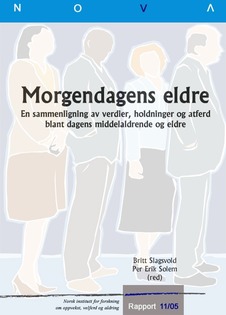| dc.description.abstract | This report deals with possible future changes in the life circumstances of the elderly along two main paths. First, will tomorrow's elderly have other preferences, opinions, or values than elderly today? Second, will changes in family structure affect the potential for informal care and support? We use data from a large Norwegian survey on Life-course, Ageing, and Generations (NorLAG), which focus on a variety of life domains in the second half of life. NorLAG comprises 5600 individuals aged 40-79 from 30 municipalities in four regions of Norway. We reflect on possible changes by comparing age-cohorts groups. Our findings indicate that elderly health care users of tomorrow will be less modest, more demanding, and expect more autonomy. Furthermore, they are likely to have more individualistic values, thus valuing personal achievement, pleasure, and new experiences, and less likely to hold traditional values, such as conformity or modesty. Ageing may however, to the extent it entails frailty or care needs, reduce the possibility of living in accordance with individualistic values. This may for some individuals induce depression or passivity. The number of divorced elderly parents will rise in the future, and these may receive less care from their children than their married counterparts. The rise in cohabitation, on the other hand, does not seem to warrant concern. Cohabitors exchange the same amount of emotional support with their partners' parents as do marrieds. «Modern» men partake more in household and care work, and may in the future lessen some of the demand on social services to the old. However, new gender roles do not seem to influence the amount of assistance to aged parents - neither in a positive nor negative direction. We see no indication that volunteer work may ease the pressure on health care services in the future, not even after early retirement. However, there is nothing to indicate that coming generations will be less interested in their work or more inclined to retire early. This report also deals with the coming «agequake» and the consequences for tomorrow's health care services, e.g. concerning a dramatic rise in the number of depressed elderly. We also explore lifestyle and health behavior, e.g. smoking, alcohol consumption, exercise, and obesity, from which a complex picture emerges as we witness both positive and negative trends. Differences between the health behaviors of men and women are declining, as especially women's health behavior is changing. A key factor behind this leveling appears to be increased educational level. | en |
| dc.description.abstract | Gjennom fjorten kapitler tar denne rapporten for seg spørsmål om nye generasjoner av eldre kan tenkes å bli annerledes enn dagens eldre er. Utgangspunktet er informasjoner fra Den norske studien av livsløp, aldring og generasjon - NorLAG. Det er god grunn til å vente at morgendagens eldre vil bli mindre beskjedne og mer kravstore. Kanskje vil de også stille større krav til seg selv og til egen mestring enn tilfellet er i dag. I rapporten diskuteres det videre om flere skilte gamle, flere samboere, flere barnløse og endringer i kjønnsrollemønstrene kan påvirke framtidig utveksling av uformell hjelp og støtte innen familien og mellom generasjonene. Undersøkelsen tyder på at tross store endringer i familiestruktur vil endringer i familieomsorg bli beskjedne. Andre tema som taes opp og diskuteres i forhold til fremtidens pleie- og omsorgstjenester, er mentale helseproblemer blant morgendagens eldre, mulige konsekvenser av middelaldrendes helsevaner, tilgangen på arbeidskraft og nye generasjoners større fortrolighet med IKT. Artiklene er skrevet av medlemmene i forskergruppen som arbeider med NorLAG. Studien ledes av dr.philos. Britt Slagsvold. Hun har redigert rapporten sammen med cand.psychol. Per Erik Solem. | no_NB |
